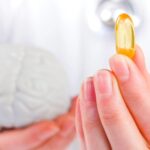1. Introduction: The Mystery of Constant Fatigue
You sleep well, eat right, and still wake up tired — what’s draining your energy?
If this sounds familiar, you’re not alone. Millions of people struggle with unexplained fatigue, foggy thinking, and a lack of motivation despite seemingly healthy habits. Often, we blame stress, poor sleep, or age. But what if the real culprit is something far simpler — a silent nutrient deficiency quietly stealing your energy?
Emerging research points to vitamin D deficiency as a surprisingly common cause of chronic tiredness. Known as the “sunshine vitamin,” vitamin D plays a crucial role in keeping your body energized, balanced, and strong. Yet, a large portion of the population falls short of optimal levels without realizing it.
In this post, we’ll explore why vitamin D matters, how deficiency leads to fatigue, and natural ways to restore your vitality — without relying on caffeine or energy drinks.
2. Understanding Vitamin D — The Sunshine Hormone
Vitamin D is often labeled a “vitamin,” but technically, it functions more like a hormone — influencing hundreds of processes throughout your body. From maintaining healthy bones to supporting immune balance, it’s a vital nutrient for life and energy.
Your body produces vitamin D naturally when your skin is exposed to sunlight, specifically ultraviolet B (UVB) rays. Once made, it’s converted in the liver and kidneys into its active form, which acts like a hormone to regulate calcium, muscle function, and even mood.
Vitamin D is also stored in fat and muscle tissue, which means that consistent exposure and intake are needed to maintain healthy levels. Without enough sunlight or dietary sources, your reserves can quickly decline.
3. The Hidden Epidemic — Why Vitamin D Deficiency Is So Common
Despite how essential it is, vitamin D deficiency has become alarmingly widespread. Why? Because modern life keeps us indoors. We spend most of our days in offices, cars, and homes — far from the sunlight our ancestors relied on.
Add to that the use of sunscreen, which while crucial for skin protection, also blocks UVB rays necessary for vitamin D synthesis. Geographic factors, darker skin tones (which naturally reduce vitamin D production), and aging — which decreases the skin’s ability to make vitamin D — all contribute to the problem.
Studies suggest that over 40% of adults in the U.S. may have insufficient vitamin D levels. The rates climb even higher during the winter months or for people living in northern regions.
4. Fatigue Explained — How Low Vitamin D Zaps Your Energy
So how exactly does a vitamin deficiency make you feel exhausted? The answer lies deep within your cells — in the mitochondria, the “powerhouses” responsible for producing energy.
a. Impaired Mitochondrial Function
Vitamin D helps mitochondria work efficiently. When levels drop, these energy factories struggle to convert nutrients into usable fuel (ATP). The result? Sluggishness and persistent fatigue, even when you’ve had enough rest.
b. Reduced Muscle Performance and Recovery
Low vitamin D affects muscle strength and endurance, which means you tire faster and recover more slowly from exercise or daily activity.
c. Mental and Emotional Energy
Vitamin D also influences neurotransmitters like serotonin and dopamine, which regulate mood and motivation. Deficiency is linked to low mood, brain fog, and even mild depression — all of which contribute to the feeling of being constantly drained.
5. Recognizing the Symptoms — Are You Deficient?
Vitamin D deficiency often goes unnoticed because its symptoms mimic other conditions. But there are telltale signs your body may be running low:
-
Constant tiredness or lack of energy
-
Muscle weakness or slow recovery
-
Brain fog or trouble concentrating
-
Frequent colds or infections
-
Bone or back pain
-
Low mood or irritability
You might chalk these up to a busy lifestyle or burnout, but your body could be signaling a deeper imbalance — a nutrient shortage that’s easy to fix once you recognize it.
6. Testing and Diagnosis — Know Your Levels
The good news? Testing your vitamin D levels is quick and straightforward. A 25-hydroxy vitamin D test (sometimes called 25(OH)D) measures the amount of vitamin D circulating in your blood.
Most health professionals consider levels between 30–50 ng/mL to be healthy, though some experts recommend maintaining slightly higher levels for optimal vitality and immune function.
If your results are low, your doctor may recommend lifestyle adjustments, supplementation, or retesting after a few months.
7. Fixing the Fatigue — How to Restore Your Vitamin D Naturally
If your levels are low, don’t worry — recovery is simple and natural.
a. Soak Up the Sun
Aim for 10–30 minutes of direct sunlight several times a week, depending on your skin tone and location. The best time is midday when UVB rays are strongest. Avoid overexposure, and balance sun safety with vitamin D needs.
b. Eat Vitamin D-Rich Foods
Add these to your diet:
-
Fatty fish (salmon, tuna, mackerel)
-
Egg yolks
-
Fortified dairy and plant-based milks
-
Mushrooms exposed to UV light
c. Consider Natural Supplements
Sometimes sunlight and diet aren’t enough — especially during winter or for those who live in low-sun regions. In such cases, vitamin D3 supplements can help you reach and maintain healthy levels.
Always check with your healthcare provider for the right dosage and type based on your needs.
8. Beyond Energy — The Other Benefits of Vitamin D
While restoring vitamin D can dramatically improve energy, the benefits extend far beyond that:
-
Stronger Bones & Teeth: Vitamin D helps your body absorb calcium, maintaining bone density and reducing fracture risk.
-
Better Immunity: It supports immune cell function, helping your body fight infections and inflammation.
-
Mood Stability: Adequate vitamin D is associated with balanced mood and emotional well-being.
-
Healthy Aging: Maintaining optimal levels supports overall vitality, muscle health, and longevity — especially crucial for adults over 40.
By optimizing your vitamin D, you’re not just fighting fatigue; you’re investing in your long-term wellness and resilience.
9. Prevention Tips — Keeping Your Levels Steady Year-Round
Consistency is key. Here’s how to make vitamin D maintenance part of your healthy lifestyle:
Morning Sunlight:
Get gentle morning rays on your skin to stimulate vitamin D production naturally.
Balanced Diet:
Include vitamin D-rich foods in your weekly meals, especially oily fish and fortified products.
Regular Testing:
Check your vitamin D levels at least once or twice a year to ensure you stay in the optimal range.
10. Conclusion: Reclaim Your Energy — One Ray of Sunshine at a Time
Fatigue doesn’t always mean you’re overworked or aging — sometimes, it’s your body’s quiet call for sunshine and balance.
By understanding the role of vitamin D and taking small, consistent steps to maintain healthy levels, you can restore your natural vitality and mental clarity — without depending on caffeine or quick fixes.
So, before you blame your schedule or stress, ask yourself:
“Could your constant tiredness be your body’s way of asking for more sunshine?”
Take that as your cue to step outside, lift your face to the sun, and reclaim the energy that’s been waiting within you all along.


